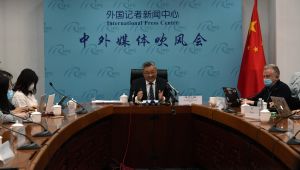According to Siegfried Hecker, the former director of the Los Alamos National Laboratory, North Korea is working on two new nuclear facilities, a light water power reactor in early stages of construction, and a "modern, clean centrifuge plant" for uranium enrichment. Mr. Hecker visited the facility over the weekend and says it appears nearly complete.
The centrifuge plant is particularly significant because it could produce more than enough highly enriched uranium to make a nuclear weapon every year-and it may not be the North's only such facility. North Korea's artillery bombardment of the South Korean island of Yeonpyeong on Tuesday makes it doubly clear that Pyongyang intends to leverage its new nuclear breakthrough for maximum concessions from the international community.
This nuclear revelation is not an intelligence failure. Over the past decade, intelligence analysts have consistently predicted North Korea's path to nuclear weapons and noted the increasing evidence of its missile and nuclear proliferation. The failure has been that of policy makers and pundits who denigrated the analysis, ignored it, or clung to the fallacy that North Korea would abide by a denuclearization deal.
In 1994, Clinton administration negotiators acknowledged that North Korea might be experimenting with uranium enrichment, but they chose to focus on an agreement called the Agreed Framework freezing the North's plutonium production at the Yongbyon facility. Intelligence agencies followed the uranium trail, but policy makers ignored it. As North Korea's most senior defector, Hwang Jang Yop, told us in 2004, the regime negotiated the Agreed Framework with every intention of "confronting the U.S. with a nuclear deterrent" before the reactors were complete and inspections became necessary.
In 2002, the Bush administration received compelling intelligence about active North Korean efforts to procure the equipment and materials necessary for a highly enriched uranium (HEU) facility. The experts had put together multiple-source information like a Rosetta Stone in an amazing piece of sleuthing. The exact state of the program was still unclear, but estimates were that it could be up and running within the decade. This was right on target, as we now know.
The North's clandestine HEU program was a blatant violation of the Agreed Framework, and in response the Bush administration suspended shipments of heavy fuel oil to North Korea. Critics immediately accused President Bush-not Kim Jong Il-of destroying the nuclear deal, even though the evidence demonstrated that the North had been assembling the HEU program since at least the 1990s.
By 2007, North Korea tested a nuclear device and the six-party talks were bogged down. U.S. negotiators were keen to shoehorn the talks back into the original Agreed Framework, with its focus on freezing the Yongbyon reactor, but the intelligence on the HEU program stood in the way. Negotiators set the issue aside, publicly and privately questioning the original assessment.
The New York Times and others aided this effort by reporting that the top U.S. intelligence expert on North Korea had "downgraded" his assessment on the North's HEU program in testimony to Congress in February 2007. In fact, he was simply reporting that the U.S. knew less about it-not surprising given that Pyongyang was alerted to our insights and could better hide its efforts.
Meanwhile, North Korean negotiators warned our delegation in Beijing in March 2003 that unless the U.S. ended its "hostile policy," Pyongyang was prepared to "demonstrate its deterrent," "expand its deterrent" and "transfer its deterrent." True to its word, Pyongyang did all three.
When stories leaked that the two of us were sent in February 2005 to inform Japan, Korea and China that uranium hexafluoride likely originating in North Korea had shown up in Libya, we were accused by outside experts and sources in the State Department of exaggerating the intelligence. After the CIA publicly noted North Korean complicity in a Syrian reactor construction project that Israel bombed in September 2007, the U.S. negotiating team successfully argued within the U.S. government to set aside the proliferation issue in order to focus on obtaining North Korean agreement on "verification protocols" to account for the plutonium at Yongbyon.
As a result, U.S. sanctions were lifted and North Korean illicit funds that had been frozen in a bank in Macao were returned, but no protocols were signed. Instead, North Korea conducted a second nuclear test. Meantime, evidence mounted that Myanmar was next in line seeking nuclear capabilities from Pyongyang.
It should be obvious by now that Pyongyang seeks acknowledgment as a nuclear state and intends to continue leveraging its proliferation threat to enjoy perpetual concessions from the U.S. North Korean officials have told outsiders that if America is concerned about proliferation, we should negotiate an "arms control agreement" with the North as mutual nuclear weapons states.
This would validate Pyongyang's weapons status and leave the door open for repeated escalation of the North's own weapons programs or proliferation, as U.S. credibility and deterrence steadily eroded. The existence of a highly enriched uranium facility makes this dynamic even more dangerous.
The Obama administration has said that the bombardment of Yeonpyeong is not a crisis, which is probably wise if the aim is to avoid granting the North even more leverage. On the other hand, it would be a colossal mistake to return to negotiations as if provocations are merely the price of doing business with Pyongyang. The focus right now should be on containment, interdiction and pressure. The inability to do so on a sustained basis until now was a failure of policy, not intelligence.
Tobey, William. “Why We're Always Fooled by North Korea.” The Wall Street Journal, November 24, 2010



